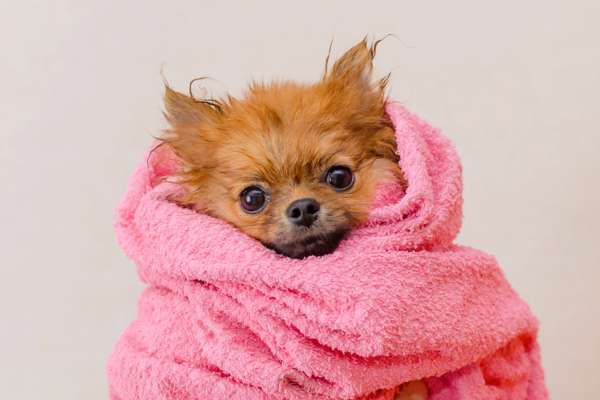As summer arrives, we always remember to carry sunscreen to avoid sunburn. But do you know your dog can get sunburn, too?
Summers mean a lot of outdoor activities, which means exposure to harmful UV rays. As a pet parent, we want to protect our doggies from everything that risks their health. But we cannot stop them from having fun.
Just like us, dogs are prone to sunburns. But good news, everyone! We can easily avoid and treat our furry friend’s sunburn. But you cannot take human SPF 45 and start applying it to your dog. There are dog sunscreen and various natural treatments for dog sunburn, which can be helpful.
If you wish to learn more about this for your furry companion, check out this blog.
What are the Symptoms of Dog Sunburns?
Dogs can experience different degrees of sunburn, which can easily mistaken for other skin issues like allergies, bug bites, and skin masses.
If your dog spends too much time in outdoor activities, you might witness sunburn with skin damage. Various study states that dogs with a history of five or more severe sunburns are more likely to develop squamous cell carcinoma (SCC), a type of skin cancer, on the ear tips than dogs without a sunburn history.
Here is a listicle of signs of sunburn in dogs:
Red Skin: Sunburn in dogs often causes redness. This redness results from inflammation and increased blood flow to the affected area.
Itchiness: Your dog might feel itchy. It may scratch or rub the affected areas to relieve the discomfort.
Skin Sensitivity: Dogs with sunburn may exhibit magnified skin sensitivity in the affected areas. They may react vigorously if anyone touches the sunburned skin.
Dry Cracked Skin: Prolonged sun exposure can also result in dry and cracked skin in dogs. The sun’s rays can lessen the skin’s moisture, making it feel rough and dry.
Flaking Skin: Sunburn can cause dryness in the top layer of the skin. This can lead to peeling or flaking skin in affected areas.
Blistering: Dogs can develop blisters on their skin due to severe sunburn. These are fluid-filled pockets formed due to the skin’s reaction to UV radiation.
Hair Loss: Sunburn can damage the hair follicles of dogs, resulting in hair loss in the sunburn areas. It is ubiquitous in dogs with light-colored or thin fur.
High Body Temperature: Dogs may experience increased body temperature after sunburn. It happens because the inflamed skin can affect their ability to regulate body heat.
Constant Scratching: Due to discomfort and itchiness, dogs may scratch themselves excessively, worsening their condition and potentially damaging skin.
Development of Fungal Skin Infections: Skin becomes more susceptible to infections after sunburn. Fungal skin infections may take advantage of the compromised skin barrier.
Severe Cases Can Develop Ulcers: In extreme cases of sunburn, the chance of developing ulcers increases. Ulcers are open sores that can be painful and may require veterinary attention.
How to Treat a Dog Sunburn at Home?
Do you know you can treat a dog sunburn at home, too? But for this, you must know how to identify and treat them. On-time treatment can prevent sunburn from worsening and control permanent skin damage. Above everything else, it fastens the healing process and prevents other infections during recovery.
Ice therapy to sunburn area
Ice therapy is one of the most effective therapy for sunburn. If your dog gets sunburned in a large area, you must try a cool bath. You can also use old compresses, cool towels, or rinse. But ensure that your dog will be indoors and don’t come in direct sunlight. Furthermore, direct exposure to the sun can lead to more damage and sluggish the recovery process.
Use Aloe Vera gel
Homegrown aloe vera is the best, but if you don’t have one, don’t worry. You can buy it from a nearby pharmacy. This one is a must-have product that every pet owner must have. It is advisable to use the aloe vera gel on the affected area. It is a standard treatment for various wounds and bug bites for pets.
When a dog’s skin cools down after cooling therapy, you should apply aloe vera on the skin. It will soothe and rehydrate the skin and provide comfort to the dog.
Humans can also use this product for sunburn. Due to sunburn, the skin may burn blisters; this topical gel can help treat severe burns and lessen the risk of scarring and infection.
Prevent Infection with Coconut Oil
Coconut oil hydrates the skin and acts as a moisturizing lotion. It has anti-inflammatory and antibacterial properties, safeguarding the skin from infections while treating sunburn. You may need to apply wound dressings if you notice skin changes.
Dog Breeds that Sunburn Easily
Some dogs get sunburns more than others. Dogs with fur are less prone to sunburn, but it still depends on factors like coat thickness, type of hair, etc.
Following are the breeds that need more sun protection than others:
Hairless Dogs
Dogs with less or no fur are at high risk of getting sunburn. The primary reason behind this is that they don’t have any natural barrier to protect them from sunburn. The bare skin of dogs is susceptible to harmful UV rays. You can keep your dog indoors and limit their sun exposure. You can use sunscreen and other sun protection gear to keep them safe and relaxed.
There aren’t many natural hairless breeds, but you must take extra caution with naked pups
- Xoloitzcuintli
- Chinese Crested Dog
- American Hairless Terrier
- Mexican hairless dogs
Short-Haired Dogs
Dogs with short hair and thin fur also need protection from sun rays. The leading cause of sunburns is UV rays that can get through the short coat.
Dogs can get sunburned where their fur is the thinnest or have less hair—for instance, ears, nose, and belly.
Here are some dog breeds that sunburn quickly:
- Boxers
- American Staffordshire Terrier
- Greyhounds
- Whippets
Fair Skinned Dogs
Dogs with white or lighter coats are at a higher risk for sunburn. Even with a lengthy or double coat, their pink skin is still more vulnerable to UV rays.
- Bull Terriers
- American Pitbull Terriers
- French Bulldogs
Besides these, Collies, Xoloitzcuintlis, Poodles with lighter fur, and Dalmatians are also susceptible to sunburn.
What are the risks of sunburn in dogs?
There are the following risks of sunburn in dogs:
Skin Damage:
Sunburn in dogs can cause significant damage to their sensitive skin, leading to painful redness, inflammation, and, in severe cases, blisters and peeling. Like in humans, repeated sunburns can increase the risk of skin cancer in dogs.
Discomfort and Pain:
Sunburned dogs often experience discomfort and pain, affecting their overall well-being. They may scratch or lick the affected areas, leading to further irritation and potential infection.
Risk of Skin Cancer:
Protracted exposure to the sun without protection can elevate a dog’s risk of developing skin cancer, particularly in breeds with light-colored or thin fur. Skin tumors can be challenging and may require surgery or other interventions.
Eye Damage:
Dogs with light-colored eyes are more susceptible to sunburn in their eye tissues. It can result in photokeratitis, a painful condition similar to sunburn in the cornea, leading to redness, squinting, and discharge.
Increased Heat Sensitivity:
Sunburned skin can reduce a dog’s ability to regulate body temperature effectively. Its heightened heat sensitivity can increase the risk of heat stroke, especially during hot weather.
Hair Loss and Scarring:
Severe sunburn can lead to hair loss and scarring in affected areas. It impacts the dog’s appearance and can lead to long-term skin issues.
Vulnerability to Infections:
Damaged and sunburned skin is more vulnerable to bacterial and fungal infections. It can require additional veterinary care and treatments to resolve.
Behavioral Changes:
Dogs experiencing sunburn may become irritable and anxious due to their discomfort. They might also avoid outdoor activities, affecting their overall quality of life.
Financial Costs:
Treating sunburn-related health issues, such as infections or skin cancer, can be costly regarding veterinary bills, medications, and potential surgeries.
Prevention Is Key:
Preventing sunburn in dogs through measures like providing shade, using pet-safe sunscreen, and limiting sun exposure during peak hours is essential for their health and well-being.
When is a sunburn on dogs an emergency?
If you are a pet owner, you must know when sunburn on dogs can become an emergency situation when:
Severe Blisters or Burns:
If your dog’s sunburn results in severe blisters, deep burns, or extensive skin damage, it’s an emergency. These conditions can be intensely painful and require immediate veterinary attention.
Swelling and Inflammation:
When the sunburned area swells significantly or shows infection signs, such as redness, pus, or foul odor, it’s a cause for concern. Infections can spread rapidly and need prompt treatment.
Lethargy and Disorientation:
If your dog becomes unusually lethargic, disoriented or experiences vomiting or diarrhea after sun exposure, it may indicate heatstroke, a severe consequence of sunburn. It is a critical emergency requiring immediate cooling and medical assistance.
Eye Sunburn:
Sunburn on the cornea (photokeratitis) can lead to extreme pain, squinting, and discharge. If your dog exhibits these symptoms, especially after sun exposure, seek emergency veterinary care to protect their vision.
Breathing Difficulties:
Dogs with severe heatstroke from sunburn may struggle to breathe, pant excessively, or even collapse. It is a life-threatening emergency requiring rapid cooling and immediate veterinary care.
Signs of Shock:
Sunburn-related emergencies can lead to shock, characterized by pale gums, rapid heart rate, and weakness. If you suspect shock, seek immediate medical attention.
Ingestion of Sunscreen or Toxic Substances:
If your dog ingests sunscreen or other toxic substances while trying to relieve sunburn discomfort, contact a veterinarian.
Rapid Worsening of Symptoms:
If your dog’s sunburn symptoms rapidly worsen, even if they initially seemed mild, it’s crucial to seek veterinary help promptly. Sunburn complications can escalate quickly.
Conclusion:
Being a pet wonder, keep yourself updated because little knowledge and its implementation can reduce the risk of sunburn. Invest in your dog’s sunscreen this summer and let it enjoy outdoor activities without worry.
Always choose sunscreen free from zinc oxide and octisalate. Also, don’t use any product on your dog, including sunscreen, without a vet consultation. Additionally, you can buy UV- and UPF-protective clothing for dogs. It can also be the safest way to protect your furry companion from harmful sun rays.
FAQ:
Q.1 Does a Dog’s Nose Sunburn?
A dog’s nose is highly prone to sunburn. If your dog is spending too much time outdoors, there are possibilities that UV rays affect the sensitive, moist skin covering your dog’s sniffer.
Q. 2 Do Black Dogs Sunburn More?
Sunburn in dogs can occur regardless of their fur color, but it’s more common in dogs with lighter or thinner coats, as they have less natural protection from UV rays. Dogs with dark fur may be slightly less risk, but all dogs should be protected from excessive sun exposure to prevent sunburn and related health issues.
Q.3 Does shaving a dog in the summer increase the risk of sunburn?
Yes, shaving a dog in the summer can increase the risk of sunburn. A dog’s fur provides natural protection from the sun’s harmful UV rays. Shaving their fur removes this protection, exposing their skin to the sun’s rays, which can cause sunburn and other skin problems. It’s generally better to provide shade and use pet-safe sunscreen to save your dog from the sun rather than shaving them.
 DogExpress
DogExpress






















 in Chandigarh, India.
in Chandigarh, India. 

